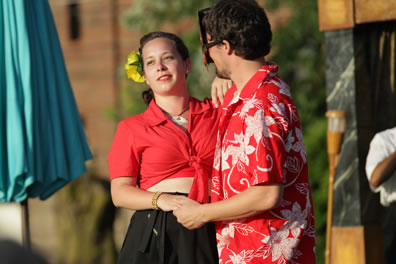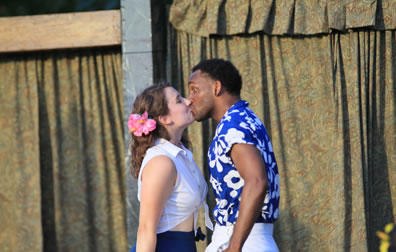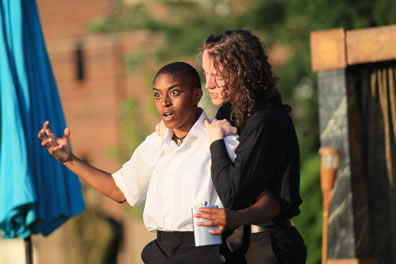Much Ado About Nothing
The Boys Are Back In Town
Hoosier Shakes, God's House, Marion, Indiana
Friday, July 21, 2017, second row, center of studio theater
Directed by Marshall B. Garrett

Beatrice (Duana M. Burby) dances with "the prince's jester" Benedick (Ryan Akers) during the masque in a Hawaiian-set Much Ado about Nothing at Hoosier Shakes, a new theater company staging William Shakespeare plays outdoors in Marion, Indiana. Photo by Glen E. Devitt, Hoosier Shakes.
It's a good start. Hoosier Shakes is only in its second year of existence producing outdoor productions of William Shakespeare plays in Marion, Indiana (indoors when it's too wet or hot outside, which is why we saw the company's Much Ado About Nothing in a 62-seat semicircle theater at the back of a church sanctuary). This is another of many current-generation companies espousing original production standards for Shakespeare's plays: universal lighting; doubling roles; cross-gender casting; live preshow and intermission musical performances by the cast; audience in close proximity on three sides; and simple, set-free staging but "enlivened costuming" serving as the production's primary visual element.
Hoosier Shakes's mission statement is "To vitalize the performance of Shakespeare and other drama for diverse communities of Grand and Wabash Counties, Indiana, by presenting inspiring, accessible, literate, experiential theatrical performance." Note, first, the local focus, and then key words like accessible, literate, and experiential, three words some would consider antitheses. Which brings us to the company's Much Ado About Nothing directed by Marshall B. Garrett.
It's a great start. The residents of Shakespeare's Messina (the Sicilian city here transferred to modern Hawaii) are lounging about the stage when a messenger enters to deliver a letter to Leonato (William Richard Burby). Behind the messenger is Jeremy Huff, the production's music director, who begins strumming his guitar as Leonato sings:
Guess who just got back today
Them wild-eyed boys that had been away
Haven't changed that much to say
But man, I still think them cats are crazy.
By the time he gets to the chorus of Thin Lizzy's "The Boys Are Back in Town," a full-fledged, full-cast musical production has broken out on the small play space. They sing and dance the entire song, after which the rest of the non-Messina cast moves off stage along with Huff and his guitar, leaving Leonato gazing again at the letter. "I also learn in this letter…" he says, delivering Shakespeare's opening line (with a slight variation). This opening signifies a production paying close attention to the play's text as well as its tone while emphasizing unabashed fun. How unabashed that fun is results in a mixed-bag production.
The Hawaiian setting is just one of a dozen different locales I've seen in 17 stage productions of this play, but it follows a current trend of tropical locations I've seen lately (Miami Beach, the Caribbean). What's unusual here is that Messina and Italy are swapped out in the script for Hawaii, e.g., "as pretty a piece of flesh as any is in Hawaii" and "He is the only man of Hawaii, always excepted my dear Claudio." It fits metrically, at least. With a portable three-curtain backdrop at the back, the stage features beach chairs and umbrellas and Polynesian lamps, and the cast, outfitted in casual beach-scene clothes by Costume Designer Nikki Smithson Bailey, hands out leis upon the arrival of Don Pedro and his party, who are dressed in Navy uniforms.
The Prince (his only identification in the cast list) has a few skewed bars on his uniform shoulder boards; clearly an officer, but hard to tell what grade. Claudio wears a silver bar (lieutenant junior grade), while Benedick is wearing an enlisted insignia. These three are in dress whites, while a rankless Don John is in a black Navy service uniform. I'll be accused of being picky, perhaps, but the attempts to show rank got me thinking: Wouldn't Benedick outrank Claudio? Not necessarily. Benedick as a noncommissioned officer (NCO) makes perfect sense in today's U.S. military services, as many NCOs latch on to a senior officer, following them from assignment to assignment (actually, it's the officers who latch on to them). Such senior NCOs are highly respected by the officers, are often treated as personal equals (except during official functions), and serve as mentors to junior officers (such as Claudio); they could even serve the role of "the prince's jester."
This turns out to be more than superfluous meditation, for it helps inform Melissa Harlow's portrayal of the Prince (the role is not regendered). This Prince is a man of command, invoking a serious attitude when necessary, but yet an inveterate jokester displaying an arrested emotional maturity through his incessant bawdy behavior (I've seen a couple of commanders just like this). This reading provides a consistent interpretation of the Prince throughout the play, from his interactions with the loyal NCO Benedick through his hatching plans to court Hero for Claudio during the masque and to punk Benedick and Beatrice into falling in love as sport. It even supports his behavior in the aborted wedding when he publicly insults the daughter of his host on behalf of his lieutenant. Only in his marriage proposal to Beatrice would this characterization seem to falter, as Harlow's Prince presents it in earnest, knee and all, though he quickly dissimilates when Beatrice dismisses the proposal. And yet, this impulsive act would be as much a part of his personality as would proposing as a joke. It's a matter of selling this scene as consistent to his personality, which Harlow accomplishes.
Deon Releford-Lee similarly puts together a portrayal of Claudio that flies from the traditional renditions I've seen but ends up revealing a troubled personality at the heart of Shakespeare's text. His Claudio is a young man treading the uncertain ground of transitioning from unlearned colt to responsible stallion, galloping back and forth between insecure shyness and man's man boldness. His playfulness with the Prince and Benedick includes lots of nudge-nudge, wink-wink mannerisms and hip thrusts (consider his mentors: the Prince behaves the same way). In the masque, the masked Claudio, with his hips and legs shimmying to the music, moves around the stage and even through the audience, watching the party as he shakes a banana-shaped gourd rattle grasped between two maracas, but keeping his hands at his waist all the while. Conceive the visual yourself—I'm sure this Claudio doesn't think about how lewd he appears.
When it comes to the wedding scene in which Claudio rejects Hero (Katie Little) and accuses her of being unchaste, Releford-Lee goes deep into this man-boy to expose his hurt and sense of betrayal. This is an honest version of Claudio: it's not that he's mean or, as Beatrice labels him, a villain, but that he's not yet mature enough, let alone wise enough, to reason out contexts. He reacts to his condition impulsively (again, consider his mentors). As Little's Hero states her innocence, she moves toward Releford-Lee's Claudio, who actually hugs her in comforting fashion even as the Prince levels his accusation. It's a moment of tenderness, one Claudio is caught up in, not hypocritically but impulsively tending to the woman he's loved—and still loves (or else he wouldn't feel so hurt). As that hurt again wells up in Claudio upon Don John's testimony, Claudio lets her slip from his arms as she falls, unconscious, to the floor. This scene that many productions find troublesome, Garrett stages with maximum emotional power.
Yet, there's a delicate balance at play here. This production relies much on overly physical performances to convey the text's comedy. While it fits the ultimate readings of both the Prince and Claudio, it undermines other portrayals, especially that of Leonato, who comes off as a bumbling lackwit in the play's first half, undermining his need to turn reverential—and genuinely hurt—during the wedding and afterward.
Excessive physical comedy also dogs the performances of Dogberry and Benedick. Austin Hendricks plays Dogberry, but we'll first address his performance of Don John who, in Hendricks's insightful playing, fashions himself as a James Bond villain. He couches danger in an effete attitude and sows chaos with purposeful glee. He is not sullen by nature but rather chooses to be "a plain-dealing villain," as he says. "I have decreed not to sing in my cage," he says, a line Hendricks delivers with threatening command, especially emphasizing the word decreed. Don John watches the wedding going off its rails with great relish, delightfully appreciating his work. On the other hand, his Dogberry is frantically over the top, without regard for the subtle methods Shakespeare uses to build character comedy. This is a trend I've seen in several recent Dogberry portrayals: Has Michael Keaton's Dogberry in the Kenneth Branagh film become the standard? Allow me to advance Nathan Fillion in the Joss Whedon film as a more suitable exemplifier of this great Shakespearean creation. (By the way, the members of the watch who serve Dogberry in the Hoosier Shakes production are lifeguards.)
Though not quite so exaggerated as Hendricks' Dogberry, Ryan Akers also gives a frenetic rendering of Benedick. It makes for a visually amusing character as a foil to the sharper-witted Beatrice (Duana M. Burby). However, his rushing his lines with nervous energy doesn't allow Benedick's twisted logic in all things to take its full comic effect. A crux point of this performance comes when Akers plays Benedick as several-sheets-to-the-wind drunk after the party, slurring his disdain for Beatrice, first in soliloquy and then to the Prince. The choice here is in whether drunken behavior is funnier than a clear-thinking Benedick speaking these lines, physical humor versus textual humor. However, physical humor should supplement, not supplant, the lines, and productions that underestimate the comic capabilities of Shakespeare's texts do so at their peril.
In contrast, Burby's Beatrice stands out from the rest of the Messina/Hawaii population for her sober bearing and confident wit. Burby channels Beatrice's emotions well, from snide to outright anger to disgust to, finally, love. "Stand I condemned for pride and scorn so much?" she says after Hero and Ursula (Eily Hite) have gulled her. "Contempt farewell, and maiden pride adieu! No glory lives behind the back of such. And Benedick,"—here Burby pauses as her Beatrice considers everything she's heard, knows, and feels—"love on," she continues in a gush. "I will requite thee, taming my wild heart to thy loving hand."
Akers achieves a beautiful moment when Benedick decides to take Beatrice up on her request to challenge Claudio to a duel. "Enough: I am engaged. I will challenge him," he says, at which Burby moves forward to kiss him. He, however, steps back and shakes his head no. "I will kiss your hand," he says, doing so as a gentleman and a (noncommissioned) officer should, and as he continues this short speech, he moves the flower in her hair from above her right ear to her left.


Top, Hero (Katie Little) surprises Claudio (Deon Releford-Lee) with a kiss; above, Borachio (Lydia Williamson, front) tells Don John (Austin Hendricks) how he can derail the Claudio-Hero romance in Hoosier Shakes's outdoor production of William Shakespeare's Much Ado About Nothing. Photo by Glen E. Devitt, Hoosier Shakes.
Blake Churchill plays Antonio, Leonato's brother, and though he relies on a cane and limp to represent old age (Churchill looks so young, Claudio might be a reach for him), his angry passion is electric in the scene during which the two brothers accost the Prince and Claudio after Hero's supposed death. Along with the heartfelt fury Churchill's Antonio unleashes, he speaks daggers aimed directly at Claudio's psychological heart, berating him as a man too young of mind and soul to be honorable no matter what his wartime heroics might be: "I know them, yea, and what they weigh, even to the utmost scruple, scrambling, out-facing, fashion-monging boys, that lie and cog and flout, deprave and slander, go anticly, and show outward hideousness, and speak of half a dozen dang'rous words, how they might hurt their enemies, if they durst, and this is all" (emphasis in the delivery).
The character of Margaret (Emily Robinson) is also insightfully developed. Many productions I've seen don't know what to do with Hero's waiting woman who pretends to be Hero in Don John's scam of Claudio and the Prince. She says nothing during the aborted wedding when the men accuse Hero of receiving a man at her chamber the night before. So what to make of her motive in the first place and nonaction here? In this production, such questions are moot because Robinson's Margaret is a general flirt who loves the attention of men and is quite hung up on sex (witness her haranguing Beatrice with an incessant stream of sexual comments before the wedding). In Act V when Benedick asks Margaret to fetch Beatrice to him, Robinson's Margaret goes into all-out seduction mode, the insinuation being that they probably have had a one-night stand or two in the past (or almost did, at least); she certainly wants one now, but as Benedick bandies her sexual punning, Akers makes earnest his warning to her that "pikes with a vice … are dangerous weapons for maids." These glimpses of Margaret in the text lend credence to why she would hang with Borachio and pretend to be Hero: it's all good sexual gamesmanship.
This Borachio is pretty cool to hang with, too. Lydia Williamson gives him a dangerous charm but still with comic moments in her physically gifted performance. Doubling as the Friar, she delivers one of the play's best visual laughs, exchanging her large prayer book for a palm-size one when Leonato tells her to "be brief." When she asks Claudio, "You come hither, my lord, to marry this lady?" and Claudio replies, "No," Williamson's Friar starts thumbing through her book with puzzled consternation as the groom has gone off-script. Despite these incisively comic moments, when later in the scene she lectures Leonato for berating Hero's alleged unchaste ways, Williamson displays brimstone running through the Friar's veins.
As at the play's start, Garrett uses the text to inspire a big musical number at the play's conclusion. "Let's have a dance ere we are married," shouts Benedick. "We'll have dancing afterward," insists Leonato. "First, of my word," Benedick shoots back: "therefore play music." In other words, "Shut Up and Dance," and the entire cast and some audience members sing and dance to the Walk the Moon hit.
"Inspiring, accessible, literate, experiential theatrical performance": Hoosier Shakes has accomplished that mission with Much Ado About Nothing.
Eric Minton
August 14, 2017
Comment: e-mail editorial@shakespeareances.com.
Start a discussion in the Bardroom



 Find additional Shakespeareances
Find additional Shakespeareances